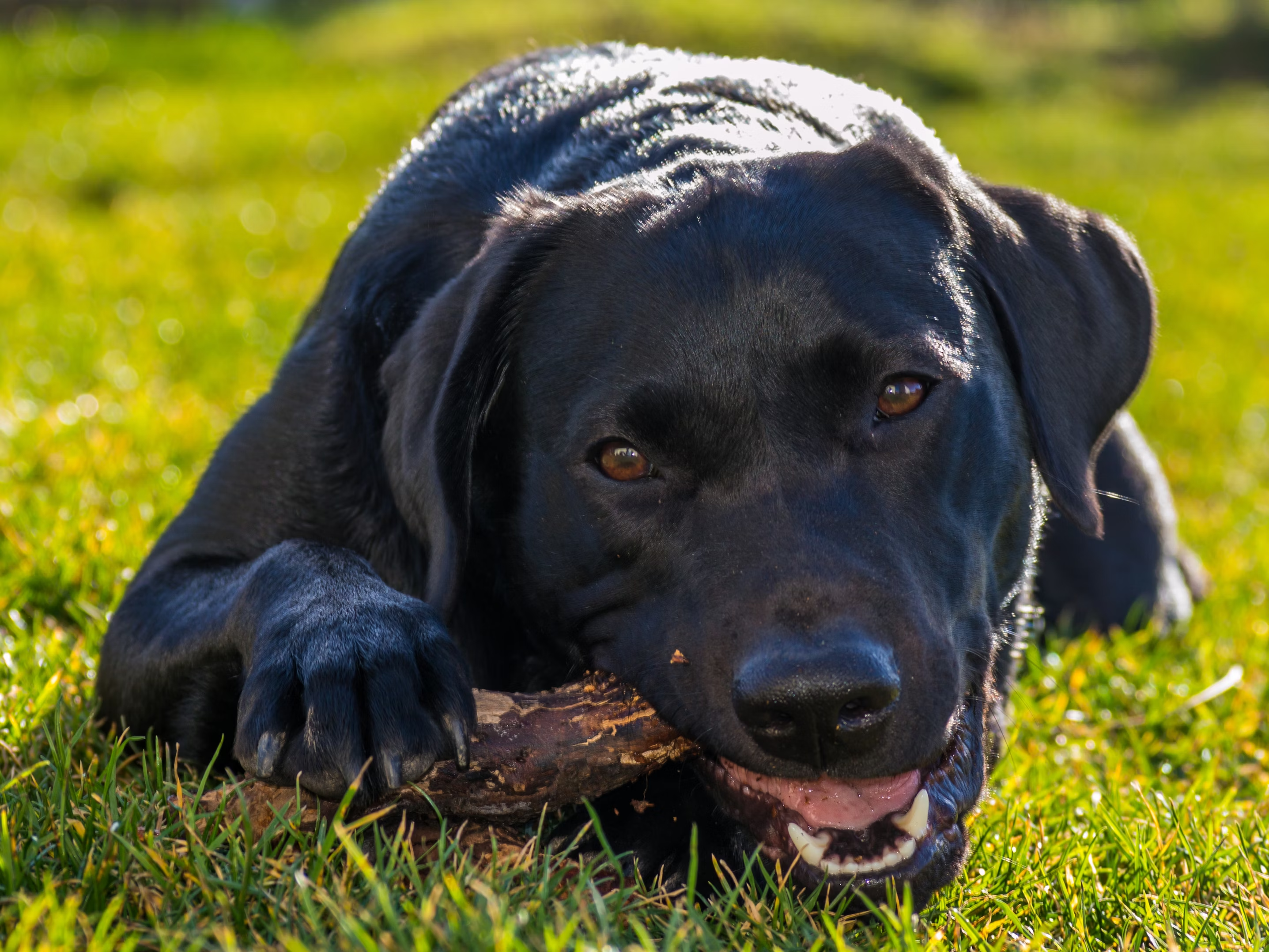Labrador Retrievers are one of the breeds primarily sought after globally. Friendly, energetic, and intelligent in nature, these dogs are commonly chosen as pets, service animals, and even hunting companions. However, this does not mean that they have only downsides; owning a Labrador has its challenges,, just like any dog breed.

Like every other breed, Labradors have special needs and characteristics that may not suit every owner. We will talk about the disadvantages of owning and raising a Labrador, together with solutions for common problems such as discipline, behavior, and aggression.
High Energy Levels and Exercise Needs
One of the major disadvantages of owning and raising a Labrador Retriever is the amount of energy they require. Labradors are active, playful dogs that need to get a good workout to keep them on their toes and healthy.
If you have a hectic life and do not have time for daily walks, you may not find it suitable to take home a Labrador Retriever puppy. If they do not get an adequate amount of exercise, Labradors may get restless, bored, and destructive. They may chew up all the furniture, dig up your garden, or bark excessively.
You would want to avoid these problems by spending at least an hour or two per day walking, running, or playing with your Labrador. Though many dogs are perfectly okay with staying in one spot for a while, Labradors, on the other hand, love exercising, and therefore, owners must be ready to spend much time outdoors with them. Such activities will include fetching, swimming, or hiking.
In order to understand better check out Do Labradors Get Separation Anxiety: Complete Guide .
Shedding and Grooming Needs
Labradors have thick, double coats that shed really freely, especially during the shedding season in spring and fall.
Whether you have a white Labrador Retriever, a brown Labrador Retriever, or a black Labrador, shedding just is something that will be a part of your life. So, their coats need to be brushed regularly to be able to deal with the shedding and prevent matting.
This can be bad for owners who want low-maintenance dogs. The hair may cling to furniture, floors, and clothes t,enecessitatingrequent cleaning.
Although some breeds require minimum grooming, Labradors still need to be brushed at least once a week, and get bathed sometimes to have healthy coats as well as minimize shedding.
Prone to Weight Gain and Health Issues
Labradors are food lovers and easily become obese. Overfeeding with inadequate exercise might bring harmful effects to your Labrador, making it obese.
An obese Labrador is prone to numerous health issues; hence, various health conditions may affect an obese Labrador, including joint problems, heart diseases, and diabetes. The owners should maintain their dog’s safety by eating a proper diet and exercising.
Besides the tendency to become obese, other genetic health problems that one can get with the different forms of the Labrador Retriever are hip and elbow dysplasia, progressive retinal atrophy (PRA), and ear infections.
If you select a Labrador Retriever puppy from a reputable breeder who tests for these issues, you avoid quite a few health complications.
Destructive Chewing

As a breed, Labradors have strong jaws and will naturally chew. This tends to be most pronounced when they are young, but it can quickly become a major problem for owners if their Labrador develops destructive chewing habits.
Most puppies chew as part of the teething process; mature Labradors may, however, go on to chew out of boredom, stress, or lack of exercise.
To inhibit destructive chewing, make sure your Labrador has the right amount and suitable chew toys. Then, that energy of chewing will be directed elsewhere than towards the furniture, shoes, or other possessions within your home.
PhRegular physical and mental stimulation of ur Labrador ren helps reduce this kind of destructive behaviour.
Jumping and Rough Play
Another frequent issue about owning a Labrador is that they like to jump on people, especially when they are excited. This could be dangerous for small children, the elderly, or any one person who does not expect a dog to leap onto them.
Labradors are powerful and muscular dogs, and their very enthusiastic jumping can knock someone over.
You should, therefore train your Labrador well when it’s young because it’s easier to train them and suppress undesirable habits. Teach him not to jump on people and not to play vigorously otherwise, as he may grow up with terrible habits, not to mention accidents that may happen.
The first sign of separation anxiety is jumping, which most often gets triggered by the owner’s departure and was previously encouraged or tolerated by him.
Labradors are social animals that are deriving moments of glee and greatness from enjoying company and companionship.
Check out the training program to understand your Dog and train them early.
Train your dog by understanding them better
Separation Anxiety
They bond well with their families, but this can be really notorious in instances of severing the bond with them, causing separation anxiety. A Labrador might become extremely aggressive or excessively bark, chew on furniture, or even try to escape the house.
That behaviour can be really disadvantageous when owners go out for long hours at work or even spend time away from home.
The need to provide your Labrador with much company, such as sitters, family members, and other pets, can help cope with this separation anxiety. Training your Labrador to be comfortable with being alone can also help.
How Do You Discipline a Labrador?
Owning a Labrador is having a super high energy dog in your house but they must be disciplined by consistency, patience, and positive reinforcement. As labradors are smart dogs, they readily respond to training, but may become stubborn if not positively disciplined.
1. Use Positive Reinforcement. Reward your Labrador with treats, praise or toys when they produce the good behavior. Positive reinforcement encourages them to repeat that behaviour in the future.
2. Consistency: This is a must when it comes to disciplining any dog. It is essential that every family member maintain uniformity. Otherwise, your Labrador will be utterly confused.
3. No Corporal Punishment: Labradors are sensitive dogs, and corporal punishment will ruin their trust in you. You will have to give them stern oral commands and remove all the reward items from them once they misbehave.
4. Redirect Bad Behavior: If your Labrador is chewing on something they shouldn’t be, then redirect them to an appropriate chew toy.
Positive discipline methods help teach your Labrador to live within your commands and boundaries.
What is the behaviour problem with Labradors?
Labradors are essentially a breed of well-behaved dogs but may develop certain behavioural problems if not properly trained or exercised. Some common behaviours with different types of Labrador Retrievers include
1. Barking: Labradors bark too much whenever they become bored, anxious, or to get attention.
2. Chew: Labradors, as discussed earlier have this propensity to chew thus presenting destructive behaviors when left unattended or uncontrolled.
3. Jumping: They enjoy jumping enthusiastically, and this will cause problems unless corrected in time.
4. Leash Pulling: Most Labradors become too animated when taken for walks and will pull on the leash and it will be impossible to keep them steady.
Such behavioural issues can easily be corrected through obedience, exercise, and socialisation. Without proper correction, though, they start to get worse with time as your Labrador Retriever puppy matures into a full-grown adult.
How Do I Stop My Labrador from Being Aggressive?
Even though Labradors are generally friendly and not aggressive, any dog may be aggressive under specific circumstances.
Through various reasons such as fear, pain, or even lack of socialization, Labrador aggression can be a problem. It is, therefore important to address the situation early if you find aggressive tendencies in your Labrador Retriever types.
1. Identify the Cause: Try to determine what’s causing your Labrador aggression. Is it a fear of other dogs, territorial behaviour, or reaction to strangers?
2. Socialize Your Labrador Early: Socialization at a tender age eliminates aggression. Take your puppy to many people and animals and environments, so when they meet them again in future, they would not be fearful nor aggressive.
3. Seek Professional Assistance: If the aggression does not disappear from your Labrador, it’s probably best that you seek professional help from a dog trainer or a behaviour trainer. You should still study the situation and offer specific training techniques for its correction of aggression.
4. Avoid Punishment-Based Training: Punishment-based training may worsen aggression. Positive reinforcement and reward-based training can change your Labrador’s behaviour. Labradors, with the right kind of training and socialisation, tend to overcome aggression and become friendly, well-behaved dogs.
Conclusion
Labradors have that soft spot for their friendly and loyal side. However, owning one comes with its challenges. They have too much energy and require too much grooming, chew everything in sight, and are prone to developing behavioural problems- all of which can make them impossible for some owners to handle.
All of these can be prevented, however, with enough training, exercise, and attention. Whether you opt for a white Labrador Retriever, brown Labrador Retriever, or one of the other types of Labrador Retriever, understanding their needs and working to stop any potential problems from arising early on will ensure that you have a happy and healthy relationship with your furry friend.
Owning a Labrador: Being adequately equipped and ready can make owning a Labrador a very rewarding experience. Each dog is unique; thus, solutions working for you specifically with your Labrador make all the difference.
FAQS
1. Are Labradors good for first-time dog owners?
Absolutely, Labradors are friendly and intelligent; therefore they can be a great option for first-time owners. However, they require a lot of exercise, training, and attention, so first-time owners need to be prepared for a pet that is active.
2. Do Labradors shed?
Yes, Labradors shed extremely, during shedding seasons, spring and fall mostly. Brushing does help manage the shedding, but this means a whole lot of dog hair for the owner to contend with.
3. Are Labradors prone to health issues?
Labradors can have a potential health problem with hip and elbow dysplasia, obesity, and ear infections. All in all, such issues would easily be prevented with regular check-ups at the vet clinic, a healthy diet, and good exercise patterns.
4. How much exercise does a Labrador need?
A lab is an active dog that needs at least one hour of daily exercise. It may take many shapes like walks, playtime, swimming, or fetch.
5. Are Labradors good apartment dogs?
Yes, Labradors can make fine apartment dogs if they receive an appropriate amount of exercise and mental stimulation daily. Otherwise, they will get restless and destructive if there is no room to play or do regular outdoor activities.

